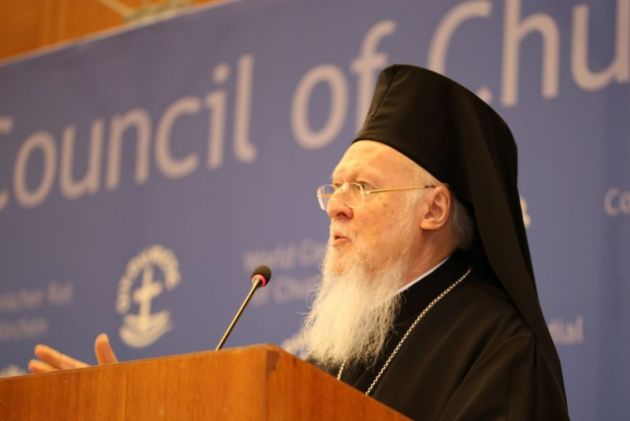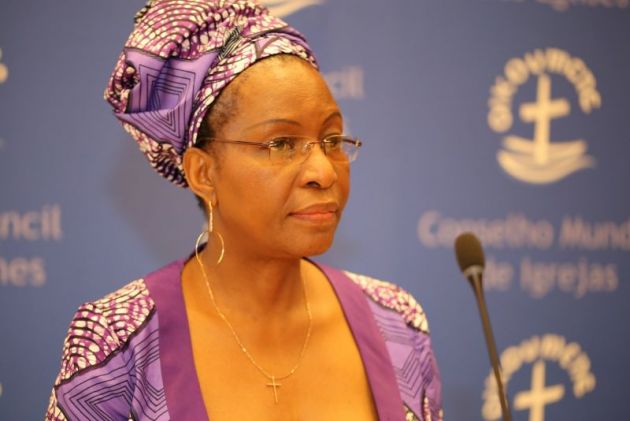Eastern Orthodox leader, the Ecumenical Patriarch, speaks out on 'sin against creation'

GENEVA - The Ecumenical Patriarch, who is the first among equals among the heads of several Eastern Orthodox churches, has made an impassioned plea for the protection of the environment laying strong emphasis on "life-giving" water.
Patriarch Bartholomew of Constantinople, who is also known as the "Green Patriarch" for the decades he has given to supporting environmental protection was speaking at the World Council of Churches in Geneva.
"Among several environmental issues, water is a very important one since water is as life-giving and sacred as the blood that runs through our body," said who is based in Istanbul.
Pope Francis, on a journey to the Egyptian capital Cairo, is to visit the prestigious al-Azhar center of Islamic studies at the end of the week and the Ecumenical Patriarch is expected to join the pontiff there, alongside the Coptic Pope Tawadros II, Vatican Radio reported.
Bartholomew's April 24 April speech was part of his official visit to Switzerland for the 25th anniversary of his enthronement as Ecumenical Patriarch and the 50th anniversary of the Orthodox Center of the Ecumenical Patriarchate in Chambésy in Geneva.
He noted that the Ecumenical Patriarchate has been a pioneer in engaging in dialogue with modern science with regards to environmental problems.
"We are glad that the WCC has followed our path, not only by implementing this annual day of prayer, but also in taking seriously the commitment of the churches in resolving the environmental crisis.
"We Orthodox were reminded by our Holy and Great Council that "the roots of the ecological crisis are spiritual and ethical, inhering within the heart of each man," (Encyclical, 14) he said.
'TRANSFORMATION OF GOD'S ENTIRE CREATIOON'
Bartholomew said, "On several occasions, we underlined that the Church cannot be solely interested in the salvation of the soul, but is deeply concerned with the transformation of God's entire creation.
"This is why our Churches need to have constant vigilance, information and education in order to understand clearly the relationship between today's ecological crisis and our human passions of greed, materialism, self-centeredness and rapacity, which result in and lead to the current crisis that we face."
For this reason he noted that a threat to nature is "also a threat to humankind; just as what is for the preservation of the planet is for the salvation of the whole world."
"For this reason," said the Ecumenical Patriarch, "we invite everyone to mobilize their resources, and in particular their prayers, in the struggle for the protection of the environment."
The general secretary of the WCC, Rev. Olav Fykse Tveit, said after the speech, "Being accountable to God the creator of all and of all things means that we have to pay attention to where our common life as humanity and our creation is under threat.
"It is well deserved that Your Holiness has been granted the title "The Green Patriarch", and you have given many church leaders and faithful Christians a new perspective on the Christian call to care for Creation."
At the same gathering the WCC's Associate General Secretary, Dr. Isabel Apawo Phiri, noted that the World Council of Churches had on Oct. 25, 2016 become a Blue Community, at a public event held at the Ecumenical Center in Geneva.
In line with the WCC's commitment toward a Blue Community, we have now personalized glass water bottles for the WCC staff and visitors. Therefore, we do not promote bottled water in the WCC premises, because tap water is safe to drink," said Phiri, a Malawian.
In 2015, the WCC's Ecumenical Water Network had issued an appeal in which it urged its churches to eliminate the use of bottled water in North America and Europe, where tap water is safe to drink.
In a statement it said, "The EWN strongly believes that among many impediments of realization of human right to water are the 'bottled water' industries." It then went on to list some of the following compelling reasons to shun bottled water.
Among these were that "Bottled water" industries are involved in "land grabbing" and "water grabbing" to expand at the cost of barring the poor to access safe drinking water, said Phiri.
"Many times governments shun their responsibilities to provide safe drinking water to the poor through their water distribution system, because people have the alternative of 'bottled water.'
"The availability of 'bottled water' allows the elites to ignore governments' failures to provide the necessary infrastructure to provide safe drinking water."

